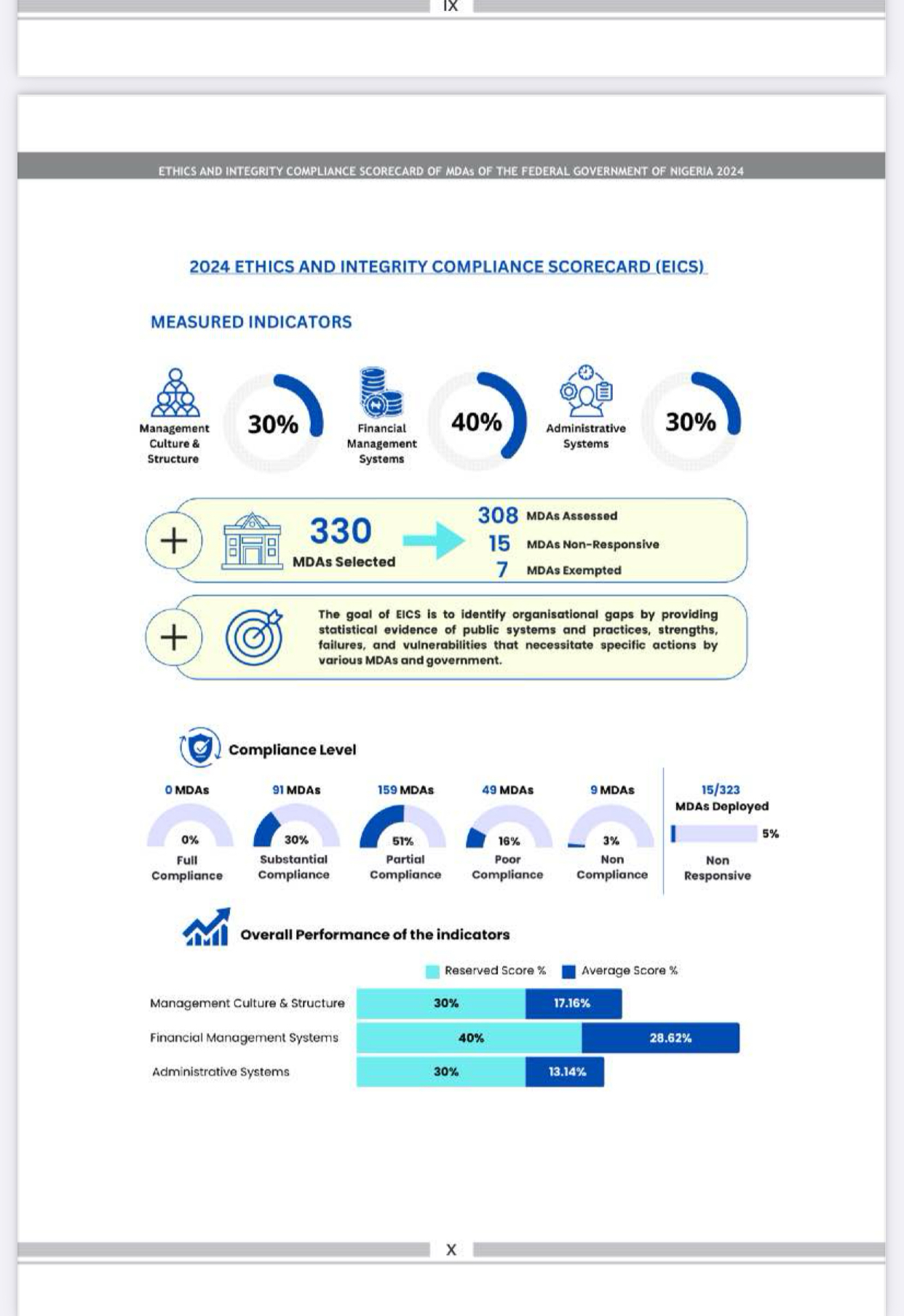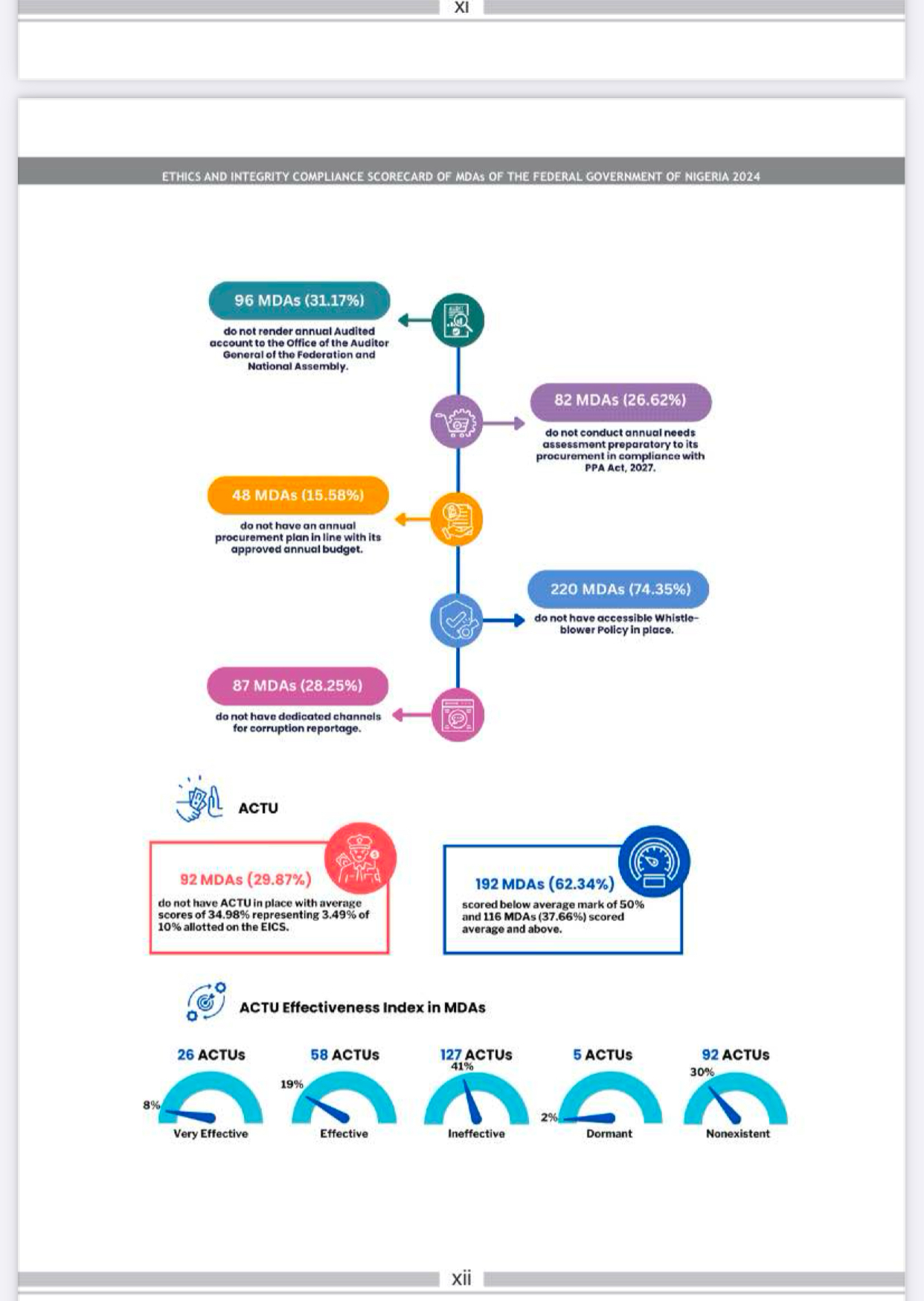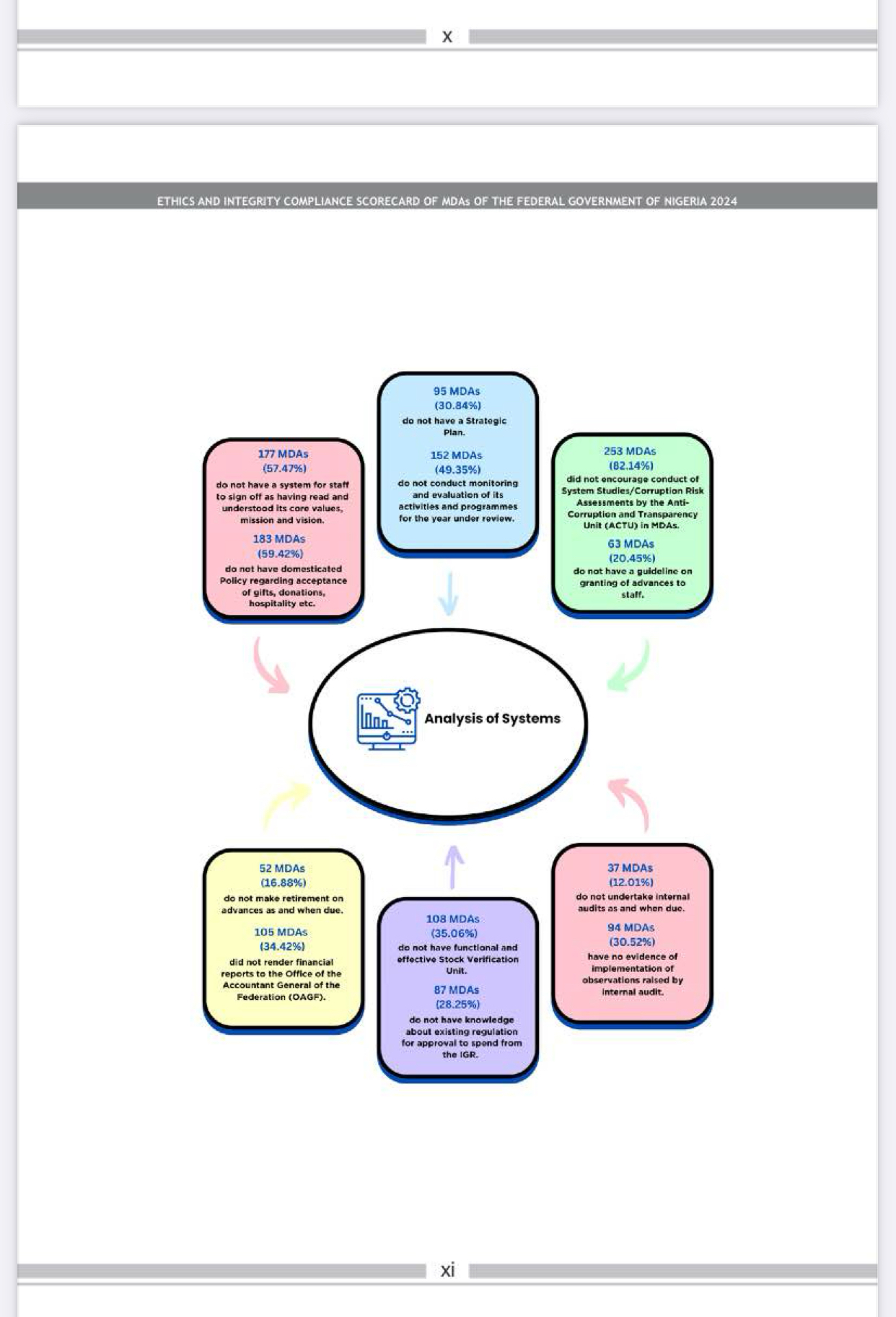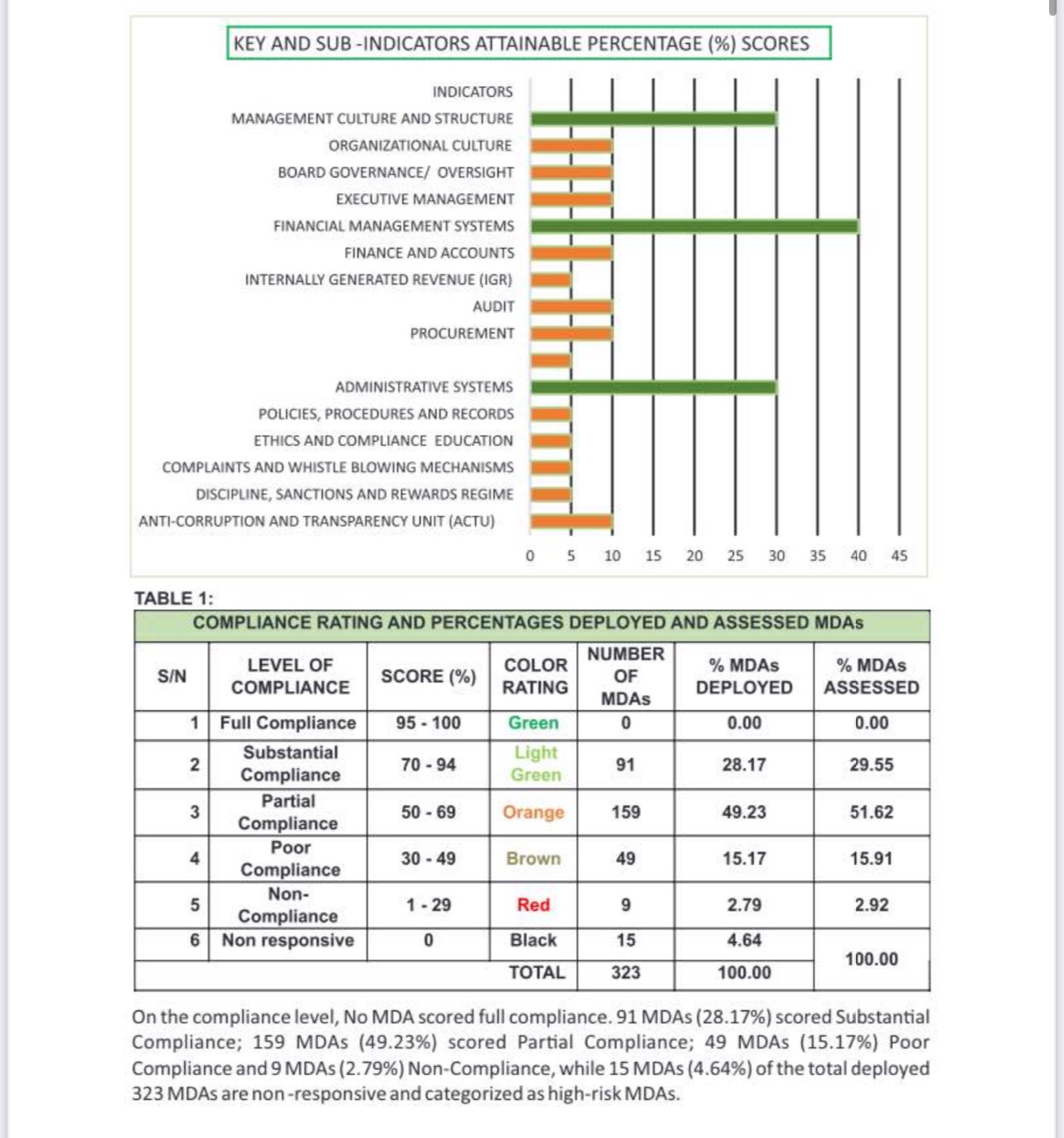Ethics & Integrity Compliance Scorecard (EICS)
Ethics & Integrity Compliance Scorecard (EICS) 2024







Prevention is central to the functions of the Independent Corrupt Practices and Other Related Offences Commission (ICPC) as provided for in Section 6 (b-d) of the Corrupt Practices and Other Related Offences Act 2000. In pursuance of this, the Commission in collaboration with Justice for All (J4A)/ DFID developed the Ethics and Integrity Compliance Score Card (EICS) in 2015.
The Scorecard evaluates MDAs compliance to ethics, integrity, statutes, policies and regulations based on three key performance indicators (KPIs): Management Culture and Structure (MCS), Financial Management Systems (FMS) and Administrative Systems (AS).
The ECS is a monitoring and evaluation tool domiciled in the System Studies and Review Department (SSRD) of ICPC. The Commission has deployed the scorecard in 2016, 2019 and 2020.
ECS deployment is particularly to track ethical, integrity and compliance deficiencies in the MDAs, and proffer remedial actions for the management of the MDAs and the government as appropriate. For Ministries, Departments and Agencies’ effectiveness and responsiveness, the Key Performance Indicators (KPIs) in the scorecard as configured are to identify some ethics and integrity standards that MDAs must comply with within the areas of Management, Performance, Service and Professional Conduct.
Therefore, ICPC’s assessment of MDAs on ethics and integrity compliance issues is to achieve the following:
a) As a comparative assessment tool for the MDAs, it creates a platform for comparing and analyzing weaknesses that make MDAs susceptible to corruption.
b) Monitor and evaluate MDAs based on Key Performance Indicators (KPI) and determine their level of compliance with institutional Ethics and Integrity requirements.
c) Enable MDAs have and evaluate feedback on performance and utilize the documents for future improvement.
d) Serves as a self-assessment tool that provides MDAs the opportunity to internally drive the fight against corruption.
e) Presents ICPC with a tracking diagnostic tool to monitor system risks and vulnerabilities and direct management and leadership to take appropriate steps to check them.
Ultimately, the goal of ECS is to ensure MDAs understand the quality of their statutes and government policies and take into account their level of compliance with ethical and accountability standards for efficiency and service delivery.
HIGHLIGHTS OF THE 2020 DEPLOYMENT OF ETHICS AND INTEGRITY COMPLIANCE SCORECARD IN MDAs
The Independent Corrupt Practices and Other Related Offences Commission (ICPC) is mandated by its enabling Act to carry out Enforcement, Prevention and Public education/mobilization against corruption. In pursuance of its preventive mandate, the Commission has initiated an annual deployment of the Ethics and Integrity Compliance Scorecard (EICS) in Federal Ministries, Departments and Agencies (MDAs). The Scorecard was developed by the Commission in collaboration with Justice for All (J4A)/DFID in 2015, to evaluate MDAs’ compliance to ethics, integrity, statutes, policies and regulations using three Key Performance Indicators (KPIs) viz: Management Culture and Structure (MCS); Financial Management Systems (FMS) and Administrative Systems (AS) which are further broken down to sub-indicators.
The Commission conducted the pilot deployment of the scorecard in 20 MDAs in 2016. The second deployment was undertaken in 280 MDAs across the 36 States of the Federation in 2019; while 352 were assessed in 2020 and in 2021. ICPC is currently deploying in 360 MDAs in 2021.
Objectives of the scorecard
The objective of the EICS deployment is particularly to track ethical, integrity and compliance deficiencies in the MDAs and proffer remedial actions to both management of the MDAs and the government as appropriate. The Scorecard equally creates a platform for comparing and analysing weaknesses that make MDAs susceptible to corruption; enable MDAs to evaluate feedbacks on performance and utilize the documents for future improvement of the MDAs’ systems and operations. It also presents ICPC with a tracking diagnostic tool to monitor system risks and vulnerabilities and direct management and leadership to take appropriate steps to check them.
Methodology of Deployment
The Scorecard is usually deployed physically, with ICPC Officers visiting assigned MDAs to deploy the tool. However, in 2020 due to the Covid-19 pandemic and the attendant restrictions, the Scorecard was virtually deployed. MDAs were informed via a letter to download the tools from the Commission’s website through a link provided in the letters, complete the tools, upload their evidential documents and submit within the timeline stipulated.
To guarantee validity of submissions made, the EICS had a provision requiring Chief Executive Officers to append their signature pledging that the template was completed correctly and truthfully by their MDAs. Contact persons and their phone numbers were also required to be submitted to the ICPC for ease of deployment and clarification of issues and questions. The 2020 deployment was carried out between June and August 2020.
Submissions by MDAs were further analysed by ICPC officers based on documentary submissions. Additional information from regulatory agencies i.e., Federal Inland Revenue Services, Bureau of Public Procurement and investigative arm of the Commission were also used where relevant during the analysis.
Where we deployed
352 MDAs were selected considering the various sectors, their contributions to the economy, importance of agencies in ensuring government drive for efficient service delivery and the commission’s mandate to ensuring transparency and accountability in public institutions. The deployment covered Federal Ministries/OHCSF, Regulators/Commissions/Councils, Agencies, Federal Universities, Polytechnics and Colleges of Education, Special Training Institutes, Federal Teaching Hospitals/Medical Centres/Special Hospitals and River Basin Development Authorities.
Outcome of the 2020 Exercise
220 MDAs of the 352 MDAs selected (amounting to 62.5%), forwarded their submissions within the set time frame. Responses from the organizations were comprehensively vetted, analysed and compiled to produce the 2020 ECS deployment report. The analysis conducted by the Commission was further validated by an independent assessor before the results were collated and the ratings compiled.
132 MDAs (37.5%) who didn’t forward their submissions were categorised and published as “Corruption High Risk (Non- Responsive) MDAs.” This was based on the Commission’s opinionthat those MDAs are apprehensive of the disclosures that may arise from the EICS deployment.
From the 220 submissions analysed, none of the MDA analysed attained full compliance, while 27 MDAs (12.2%) attained substantial compliance, 80 MDAs (36.3%) attained partial compliance and 115 MDAs (52.2%) were rated non-compliance. Key findings from the analysis revealed the following:
- 60 MDAs do not have Board/ Governing Councils responsible for policies. This gap creates opportunities for tyranny, abuse and misuse of power and funds by the Management of the affected MDAs.
- All Federal Medical Centres nationwide do not have an Establishment Act thus giving room for the Board and Management of the Hospitals to take arbitrary decisions with no legal backing.
- 88 MDAs violated the provisions of the Public Procurement Act, 2007 in the last 3 years.
- 53 MDAs have been on the FIRS tax defaulters list in the last 3 years.
- 101 MDAs did not submit their audited account to the Office of the Auditor General of the Federation and Public Accounts Committee for the last three years.
- 92 MDAs do not have functional ACTU; this suggests lack of Management support/commitment to government Anti- Corruption initiatives.
- 179 managements of MDAs do not support the conduct of Systems Studies and Review (SSR) or Corruption Risk Assessments (CRAs) and therefore do not explore or direct results of System Studies/Corruption Risk Assessments to mitigate institutional weaknesses and vulnerabilities.
- 96 MDAs do not have fully computerized systems, thus encouraging huge paper trail and falsification of records.
The first five MDAs on the ratings are Industrial Training Fund (88.9%), University of Maiduguri Teaching Hospital (88.55%), Federal College of Education Kano (86%), National Lottery Trust Fund, Abuja (84.45%), Raw Materials Research and Development Agency, Abuja (84.35%).
Final report of the deployment was presented to the presidency at the annual “ICPC National Summit on Diminishing Corruption” with recommendations on the appropriate steps to be taken by the government particularly with respect to the appointment of board members in the required Agencies. The result was thereafter published on the Commission’s website and the print media for public knowledge. Assessed MDAs were also informed of their scores and advised on areas for improvement.
Over the years, the EICS deployment has contributed in reawakening MDAs’ consciousness to improving efficiency in their operations. Some of the benefits of the deployment includes:better utilisation of government funds; improved asset register management, enhanced compliance on e-platform transactions, improved procurement integrity and due process, better record keeping, whistleblowing and witness protection, and establishment of internal anti-corruption mechanisms as well as Anti- Corruption Units.
The ICPC will continue its drive to ensure that proper structures are put in place by respective government institutions, to promote adherence to ethical standards and government regulations which would aid transparency in government business. MDAs are enjoined to support this initiative by seeing it as an opportunity to improve their systems and take steps to put in place good structures that promote integrity, accountability and service delivery.

